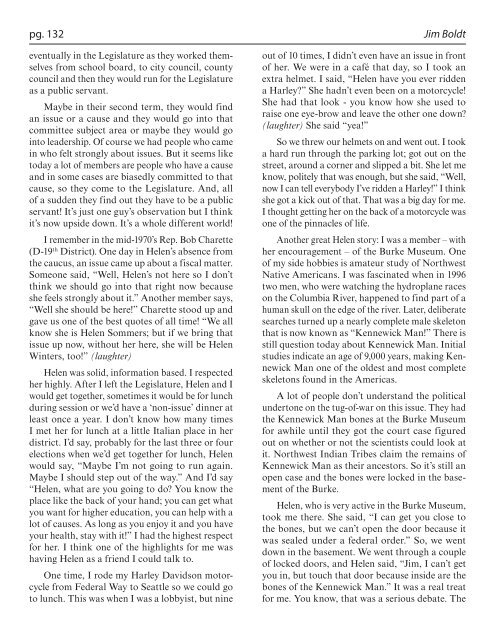Helen Sommers: An Oral History
Helen Sommers: An Oral History
Helen Sommers: An Oral History
Create successful ePaper yourself
Turn your PDF publications into a flip-book with our unique Google optimized e-Paper software.
pg. 132 Jim Boldt<br />
eventually in the Legislature as they worked themselves<br />
from school board, to city council, county<br />
council and then they would run for the Legislature<br />
as a public servant.<br />
Maybe in their second term, they would find<br />
an issue or a cause and they would go into that<br />
committee subject area or maybe they would go<br />
into leadership. Of course we had people who came<br />
in who felt strongly about issues. But it seems like<br />
today a lot of members are people who have a cause<br />
and in some cases are biasedly committed to that<br />
cause, so they come to the Legislature. <strong>An</strong>d, all<br />
of a sudden they find out they have to be a public<br />
servant! It’s just one guy’s observation but I think<br />
it’s now upside down. It’s a whole different world!<br />
I remember in the mid-1970’s Rep. Bob Charette<br />
(D-19 th District). One day in <strong>Helen</strong>’s absence from<br />
the caucus, an issue came up about a fiscal matter.<br />
Someone said, “Well, <strong>Helen</strong>’s not here so I don’t<br />
think we should go into that right now because<br />
she feels strongly about it.” <strong>An</strong>other member says,<br />
“Well she should be here!” Charette stood up and<br />
gave us one of the best quotes of all time! “We all<br />
know she is <strong>Helen</strong> <strong>Sommers</strong>; but if we bring that<br />
issue up now, without her here, she will be <strong>Helen</strong><br />
Winters, too!” (laughter)<br />
<strong>Helen</strong> was solid, information based. I respected<br />
her highly. After I left the Legislature, <strong>Helen</strong> and I<br />
would get together, sometimes it would be for lunch<br />
during session or we’d have a ‘non-issue’ dinner at<br />
least once a year. I don’t know how many times<br />
I met her for lunch at a little Italian place in her<br />
district. I’d say, probably for the last three or four<br />
elections when we’d get together for lunch, <strong>Helen</strong><br />
would say, “Maybe I’m not going to run again.<br />
Maybe I should step out of the way.” <strong>An</strong>d I’d say<br />
“<strong>Helen</strong>, what are you going to do? You know the<br />
place like the back of your hand; you can get what<br />
you want for higher education, you can help with a<br />
lot of causes. As long as you enjoy it and you have<br />
your health, stay with it!” I had the highest respect<br />
for her. I think one of the highlights for me was<br />
having <strong>Helen</strong> as a friend I could talk to.<br />
One time, I rode my Harley Davidson motorcycle<br />
from Federal Way to Seattle so we could go<br />
to lunch. This was when I was a lobbyist, but nine<br />
out of 10 times, I didn’t even have an issue in front<br />
of her. We were in a café that day, so I took an<br />
extra helmet. I said, “<strong>Helen</strong> have you ever ridden<br />
a Harley?” She hadn’t even been on a motorcycle!<br />
She had that look - you know how she used to<br />
raise one eye-brow and leave the other one down?<br />
(laughter) She said “yea!”<br />
So we threw our helmets on and went out. I took<br />
a hard run through the parking lot; got out on the<br />
street, around a corner and slipped a bit. She let me<br />
know, politely that was enough, but she said, “Well,<br />
now I can tell everybody I’ve ridden a Harley!” I think<br />
she got a kick out of that. That was a big day for me.<br />
I thought getting her on the back of a motorcycle was<br />
one of the pinnacles of life.<br />
<strong>An</strong>other great <strong>Helen</strong> story: I was a member – with<br />
her encouragement – of the Burke Museum. One<br />
of my side hobbies is amateur study of Northwest<br />
Native Americans. I was fascinated when in 1996<br />
two men, who were watching the hydroplane races<br />
on the Columbia River, happened to find part of a<br />
human skull on the edge of the river. Later, deliberate<br />
searches turned up a nearly complete male skeleton<br />
that is now known as “Kennewick Man!” There is<br />
still question today about Kennewick Man. Initial<br />
studies indicate an age of 9,000 years, making Kennewick<br />
Man one of the oldest and most complete<br />
skeletons found in the Americas.<br />
A lot of people don’t understand the political<br />
undertone on the tug-of-war on this issue. They had<br />
the Kennewick Man bones at the Burke Museum<br />
for awhile until they got the court case figured<br />
out on whether or not the scientists could look at<br />
it. Northwest Indian Tribes claim the remains of<br />
Kennewick Man as their ancestors. So it’s still an<br />
open case and the bones were locked in the basement<br />
of the Burke.<br />
<strong>Helen</strong>, who is very active in the Burke Museum,<br />
took me there. She said, “I can get you close to<br />
the bones, but we can’t open the door because it<br />
was sealed under a federal order.” So, we went<br />
down in the basement. We went through a couple<br />
of locked doors, and <strong>Helen</strong> said, “Jim, I can’t get<br />
you in, but touch that door because inside are the<br />
bones of the Kennewick Man.” It was a real treat<br />
for me. You know, that was a serious debate. The
















